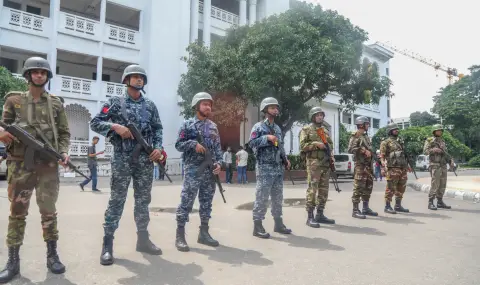In Bangladesh, 2 people died and 15 were injured as a result of clashes between protesters and the military in the town of Gopalganj in the district of Dhaka, reported the Daily Observer newspaper.
The riots in Gopalganj, 160 km from the capital, began on Saturday when around 4,000 supporters of the "Awami League" of former Prime Minister Sheikh Hasina gathered there demanding her return. They blocked the Dhaka-Khulna highway to hold a demonstration.
The military arrived at the gathering place of party activists and ordered the highway to be cleared. In response, the demonstrators began to throw bricks and stones at them, after which the forces of order used batons. The situation became tense; protesters set fire to a military vehicle.
Among the victims are four military personnel, as well as journalists and local residents.
On August 9, activists of the "Awami League", armed with knives and axes, held a rally in one of Dhaka's neighborhoods and blocked several roads for two hours. They chanted slogans calling for the return of Sheikh Hasina.
The head of the Ministry of Home Affairs of the Interim Government of Bangladesh, Sahawat Hussain, expects that the law and order situation in the country still remains difficult, will normalize in the next three to four days, the Bangladesh news portal reported.
According to Hussein, steps are being taken to restore normal life. "Some initiatives have already been taken," he said. At the same time, the head of the Ministry of Internal Affairs admitted that the situation still remains difficult.
Hussain said the Bangladesh army was trying to restore order, although it was limited in its actions compared to the police.< /span>
"The army cannot function in the same capacity as the police. However, the army tries to maintain law and order by interacting with the public, but there are limitations. What the police can do, the army can't do and vice versa, he explained.
On August 5, Bangladesh Prime Minister Sheikh Hasina resigned and left the country. She flew to India the same day and is now, Indian authorities said, safe. Student youth, dissatisfied with high unemployment and lack of prospects, joined the protests against it. After Sheikh Hasina left the country, dozens of Awami League offices were destroyed and burned in various cities of Bangladesh and more than 20 supporters of the former ruling party were killed.
After the resignation of Sheikh Hasina, an interim government was formed in the republic, headed by Nobel Peace Prize winner Muhammad Yunus. He was sworn in on August 8.
